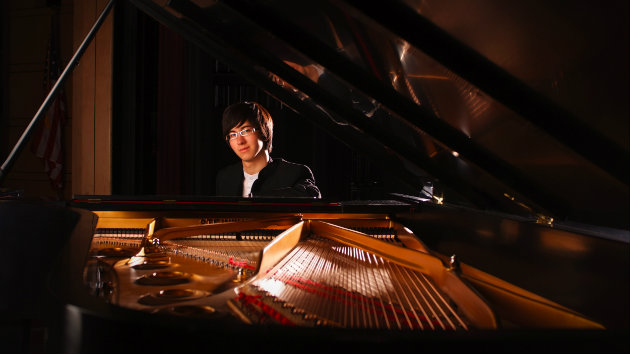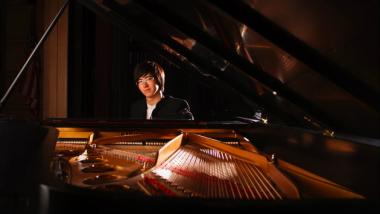
A performance by pianist Charlie Albright is timeless.
Striding onto stages worldwide, an educated guess at his age would say the young musician is likely in his mid-to-late 20s. Albright does not want years lived to be a backdrop against which he is evaluated and says in an interview that his age is “not for publication.” But shut your eyes and open your ears to his all-Schubert series, recall one of his five collaborative appearances with celebrated cellist Yo-Yo Ma, or catch the 2009 “Waltz Improvisation” video on his website to experience a sonic time warp.
Albright’s exuberant playing could be that of a 7-year-old, the age at which he moved from picking out Disney tunes and classic rock-n’-roll songs by ear to lessons with piano teacher Nancy Adsit. Or it could be the soulful playing of a seasoned master, age 75.
Albright confirms the impression that his approach snips the ribbons connecting age and performance: “Depending on what I’m playing, I control my age more or less at different times,” he says. “For Schubert concerts I’ve played; well, Schubert died young but you can’t play him right until you’re 80 years old. Every time I walked onstage I tried to imagine myself with that much life experience. That made me play with more maturity, more control. Certain things by Haydn or Mozart, I’m much more free, lively, energetic.”
Those adjectives are likely to apply to Albright’s Jan. 24 appearance in Walnut Creek with the California Symphony and Music Director Donato Cabrera. An American, jazz-inspired program has Albright joining the orchestra for the original, jazz band version of George Gershwin’s Rhapsody in Blue.
“I’ve played it a lot in the past, so it’s kind of like an old friend,” he says. “My interpretation changes each time I bring it back. I’ve found new voices, new rhythms, so it’s exciting. As with any piece [you return to], you have fresh ears.” "You have to keep it fun. If it becomes too serious, that’s not the point of Rhapsody.”
The priorities, he says, include not taking too serious an approach to the 1924 work, which Gershwin composed in record time and performed with embellishments that were never written down. “Not every line has to be shaped so that no notes stick out. That can go by the wayside. Percussive outbursts become more important: You have to keep it fun. If it becomes too serious, that’s not the point of Rhapsody.”
The technical hurdles — repeated parts, rhythmic complexities, and playing like a jazz band, with the “conversation” between individual instruments more important than blending the whole orchestral sound — demand improvisational chops. Albright says the “lost art” of improvisation is the “other side of the coin” from classical music, but insists it is foundational. “Two hundred years ago, they were doing improvisations that were eventually written down. It’s the core of music. Unfortunately, it disappeared in the 1900s. They became obsessed with turns coming on the upper note or the lower note; playing things exactly as written.” Cheered that respect for and interest in improvisation is making a comeback, he says, “If you hear a live improvisation, there’s not editing. You hear the person, not artificiality.”
The comment strikes an intriguing segue to the message sent by his online presence. Visiting his website, blog, Facebook page — multiple reviews are first and foremost. A flood of words written by people other than Albright tell a person who he is, what he thinks, how he performs. But dig a bit deeper and you find an abundance of sharing — his favorite foods (Chipotle’s chicken bowl, high among them); photos taken during tours; preferred playlists (Korean pop music); direct, chipper responses to fans’ messages, and more. It’s as if he sets up a wall with the reviews, then knocks it down with personality. Asked what impression he desires to make, he says, “I hope I come to my audience as approachable and sincere. I hope that never changes. And humble. Classical music is often the opposite of that, especially to people who aren’t familiar with it.”
Albright is grateful that while growing up in Centralia, WA, his parents never pressured him to play the piano and were “the antithesis of tiger parents.” His father suffered from Reflex Sympathetic Dystrophy Syndrome, a chronic condition whose most severe symptom is intense, fiery pain affecting the extremities. Albright says it may have influenced his academic choices. Albright completed the Harvard/New England Conservatory B.A./M.M. 5-Year Joint Program in 2012, receiving his B.A. in Economics as a premedical student and his Masters of Music in Piano Performance. “I grew up loving piano, but I also knew that you have to be able to make a living, pay the bills. Music isn’t just how well you play, it’s about luck and blessings and factors outside of your control. I have a fallback.”
In the meantime, he has a healthy approach to practicing and performing that includes micro rest. “Even a third of a second of rest can make a difference,” he says. While his left hand plays a run, the right hand lifts and rests. The voice of his first teacher, Adsit, stays with him, reminding him to stay loose, drop his shoulders, and resist tightening during difficult passages.
Albright isn’t one to practice for hours and says there’s one thing he will never play without. “Soul is the deep point of music. I’d rather miss half of the notes and move the audience than play perfectly and fail to communicate anything. Joy, tragedy, desperation, despair, happiness, whatever, you must move audiences — that is the point of music.”

